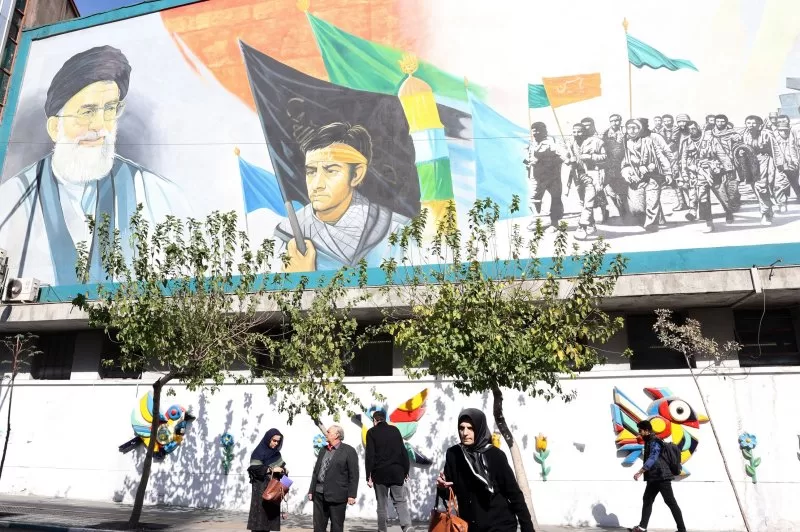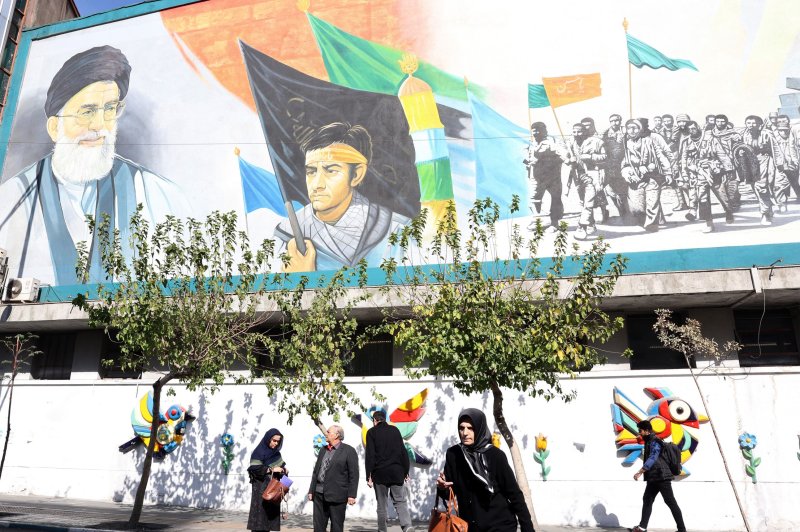Iranians walk past a wall painting of Supreme Leader Ayatollah Ali Khamenei in Tehran, Iran, on Saturday. Israel Defense Forces confirmed it conducted precise strikes on military targets in Iran. Photo by Abedin Taherkenare/EPA-EFE
Oct. 26 (UPI) — Israel on Saturday morning said it concluded retaliatory strikes on Iran that lasted several hours overnight and were focused on military targets.
The strikes were in response to Iran’s ballistic missile barrages on Israel earlier this month and in April.
“I can now confirm that we have concluded the Israeli response to Iran’s attacks against Israel,” Rear Adm. Daniel Hagari said during a briefing. “We conducted targeted and precise strikes on military targets in Iran – thwarting immediate threats to the State of Israel.”
In a statement, Israel said planes safely returned home.
Tehran is about 1,000 miles from Jerusalem.
Israel’s military is warning Iran against further escalation and it “reserves the right to defend its citizens.”
Israeli Defense Forces said the strikes were where missiles have been built to fire missiles at Israel.
In addition, Israel said it hit air defense sites early Saturday, allowing its aircraft to attack the other targets.
“Simultaneously, we targeted Iran’s surface-to-air missile systems and air capabilities – capabilities meant to limit Israel’s freedom of aerial operations in Iran. Israel now has broader aerial freedom of action, including within Iran,” Hagari said.
“Iran attacked Israel twice, including in locations that endangered civilians, and has paid the price for it,” he added.
Hagari said the targets attacked were chosen from “a wide bank” of targets of various types. “We will know how to choose additional targets from this bank and strike them as needed,” the spokesperson said.
The IDF announced it was beginning the strikes.
“In response to months of continuous attacks from the regime in Iran against the State of Israel – right now the Israel Defense Forces is conducting precise strikes on military targets in Iran,” IDF said. “The regime in Iran and its proxies in the region have been relentlessly attacking Israel since October 7th – on seven fronts – including direct attacks from Iranian soil. Like every other sovereign country in the world, the State of Israel has the right and the duty to respond.
“Our defensive and offensive capabilities are fully mobilized. We will do whatever necessary to defend the State of Israel and the people of Israel.”
Iran’s state-run Islamic Republic News Agency said portions of military sites in three provinces – Tehran, Ilam and Khuzestan – were struck and its air defenses were successful with damage “limited.”
“Dimensions of this incident are under investigation,” IRNA said.
Tasnim reported that two soldiers were killed in the overnight strikes.
In images broadcast by Iranian state media, it was calm on the streets of Tehran.
The New York Times reported a Russian-made S-300 air defense system of Imam Khomeini International Airport near Tehran was targeted.
Also targeted, according to New York Times sources. were at least three Iranian Revolutionary Guards Corps missile bases. And drones were sent to the secretive Parchin military base on the outskirts of Tehran.
The Washington Post reported an informed source said the strike was designed to minimize casualties and to allow Tehran to deny any major damage.
Israel’s security cabinet had deliberated on the type of strikes, including whether to conduct an all-out one.
Israeli Prime Minister Benjamin Netanyahu was in a bunker in the military base in Tel Aviv where he convened his cabinet.
The United States has urged Israel not to attack Iran’s energy infrastructure.
President Joe Biden was briefed “multiple times” throughout the evening by his National Security Adviser Jake Sullivan. The president was at his Wilmington, Del., home just before 8 p.m. Friday.
The United States “was not a participant in this military operation,” an official told CNN.
U.S. Defense Secretary Lloyd Austin spoke with Israeli Minister of Defense Yoav Gallant spoke about Israel’s strikes.
“I reaffirmed the ironclad commitment of the United States to Israel’s security and right to self-defense,” Austin said of his call with Gallant. “I made it clear that the United States maintains an enhanced force posture to defend U.S. personnel, Israel, and partners across the region in the face of threats from Iran and Iran-backed terrorist organizations and is determined to prevent any actor from exploiting tensions or expanding the conflict in the region.”
Opponents of an all-out strike said it would heighten the situation in the Middle East.
“This should be the end of this direct exchange of fire between Israel and Iran,” a senior US administration official said after the strikes told CNN.
Israel’s strikes on Iran were “very carefully prepared,” a senior US administration official said.
“It was extensive. It was targeted. It was precise. It was against military targets across Iran. It was in multiple ways, very carefully prepared. And again, I think it was designed to be effective.”
Iranian state media reported several explosions.
Several Arab nations expressed concerns the strikes, including United Arab Emirates, Saudi Arabia, Qatar, Kuwait and Egypt.
Anwar Gargash, UAE’s presidential diplomatic adviser, posted on X: “After more than a year of military confrontations and (their) unfortunate humanitarian and political repercussions, the region needs a different path that favors diplomatic work and political solutions, and pushes towards reducing escalation and confrontations in favor of communication and dialogue channels.
,,

